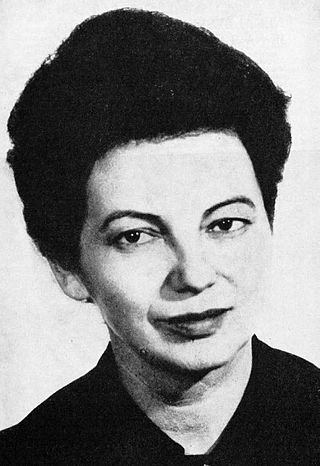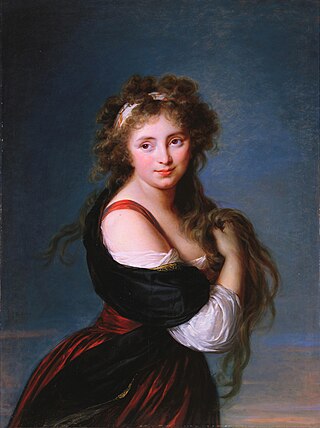
Joanne Michèle Sylvie Harris is a British author, best known for her 1999 novel Chocolat, which was adapted into a film of the same name.

Charlotte Smith was an English novelist and poet of the School of Sensibility whose Elegiac Sonnets (1784) contributed to the revival of the form in England. She also helped to set conventions for Gothic fiction and wrote political novels of sensibility. Despite ten novels, four children's books and other works, she saw herself mainly as a poet and expected to be remembered for that.

Grace Dalrymple Elliott was a Scottish courtesan, writer and spy resident in Paris during the French Revolution. She was an eyewitness to events detailed in her memoirs, Journal of my life during the French Revolution published posthumously in 1859. She was mistress, first to the future George IV, by whom she is said to have borne an illegitimate daughter, and then to the Duke of Orléans. Elliott trafficked correspondence and helped condemned Royalists and members of the French nobility escape from the First French Republic during the Reign of Terror. She was arrested several times but managed to avoid the guillotine, and was released following the military coup that ended the Terror and resulted in the execution of Robespierre.

Major-General Sir David Ochterlony, 1st Baronet, GCB was a Bengal Army officer who served as the British resident to the Mughal court at Delhi. Born in Boston, Massachusetts, he spent most of his life on the Indian subcontinent in the service of the East India Company, seeing action in numerous conflicts.

Dido Elizabeth Belle was a British gentlewoman. She was born into slavery and illegitimate; her mother, Maria Belle, was an enslaved Black woman in the British West Indies. Her father was Sir John Lindsay, a British career naval officer who was stationed there; later knighted and promoted to admiral. Lindsay took Dido with him when he returned to England in 1765, entrusting her upbringing to his uncle William Murray, 1st Earl of Mansfield, and his wife Elizabeth Murray, Countess of Mansfield. The Murrays educated Belle, bringing her up as a free gentlewoman at their Kenwood House, together with another great-niece, Lady Elizabeth Murray, whose mother had died. Lady Elizabeth and Belle were second cousins. Belle lived there for 30 years. In his will of 1793, Lord Mansfield provided an outright sum and an annuity to her.

Caroline Louisa Cavendish-Bentinck was the maternal grandmother of Queen Elizabeth The Queen Mother and a great-grandmother of Queen Elizabeth II.

Catherine Sarah Dorothea Wellesley, Duchess of Wellington, known before her marriage as Kitty Pakenham, was the wife of Arthur Wellesley, 1st Duke of Wellington.

John Reeves was a legal historian, civil servant, British magistrate, conservative activist, and the first Chief Justice of Newfoundland. In 1792 he founded the Association for Preserving Liberty and Property against Republicans and Levellers, for the purpose suppressing the "seditious publications" authored by British supporters of the French Revolution—most famously, Thomas Paine's Rights of Man. Because of his counter-revolutionary actions he was regarded by many of his contemporaries as "the saviour of the British state"; in the years after his death, he was warmly remembered as the saviour of ultra-Toryism.

Lady Jane Grey, 16th-century claimant to the English throne, has left an abiding impression in English literature and romance. The limited amount of material from which to construct a source-based biography of her has not stopped authors of all ages filling the gaps with the fruits of their imagination.

Mira Mihelič, also known as Mira Kramer Puc was a Yugoslav writer and translator.
Colonel Mark Beaufoy FRS was an English astronomer and physicist, mountaineer, explorer and British Army officer. His father, Mark Beaufoy (1718–1782), who was originally from Evesham, established a vinegar factory in Lambeth, London.

Sir James Bland Lamb, 1st Baronet, born James Burges and known as Sir James Burges, Bt, between 1795 and 1821, was a British author, barrister and Member of Parliament.

Sarah Harriet Burney was an English novelist. She was the daughter of the musicologist and composer Charles Burney and half-sister of the novelist and diarist Frances Burney. She had some intermittent success with her novels.

Jean Sarrazin was a French general during the Revolutionary and Napoleonic Wars.

Georgiana Charlotte Cholmondeley, Marchioness of Cholmondeley, formerly Lady Georgiana Charlotte Bertie, was the wife of George Cholmondeley, 1st Marquess of Cholmondeley.
Walter Arthur Charles Dicketts was a British double agent who was sent by MI5 into Nazi Germany in early 1941 to infiltrate the Abwehr and bring back information about any impending invasion of Britain.

Hyacinthe-Gabrielle Wellesley, Countess of Mornington was a French actress who became the mistress, and later the wife, of Richard Wellesley, 1st Marquess Wellesley. As an actress, she was known as Gabrielle Fagan. Through her daughter, Anne, Roland was a great-great-great grandmother of Queen Elizabeth II.

Princess Marie Élisabeth Louise of Croÿ was a member of the Belgian aristocracy and a member of the Belgian Resistance during two world wars.
Harriet Cholmondeley, sometimes called "Lady" or "The Hon" Harriet Cholmondeley, was the first wife of John Lambton, 1st Earl of Durham.

Sir William Jerningham, 6th Baronet, de jure 7th Baron Stafford was an English landowner.
















